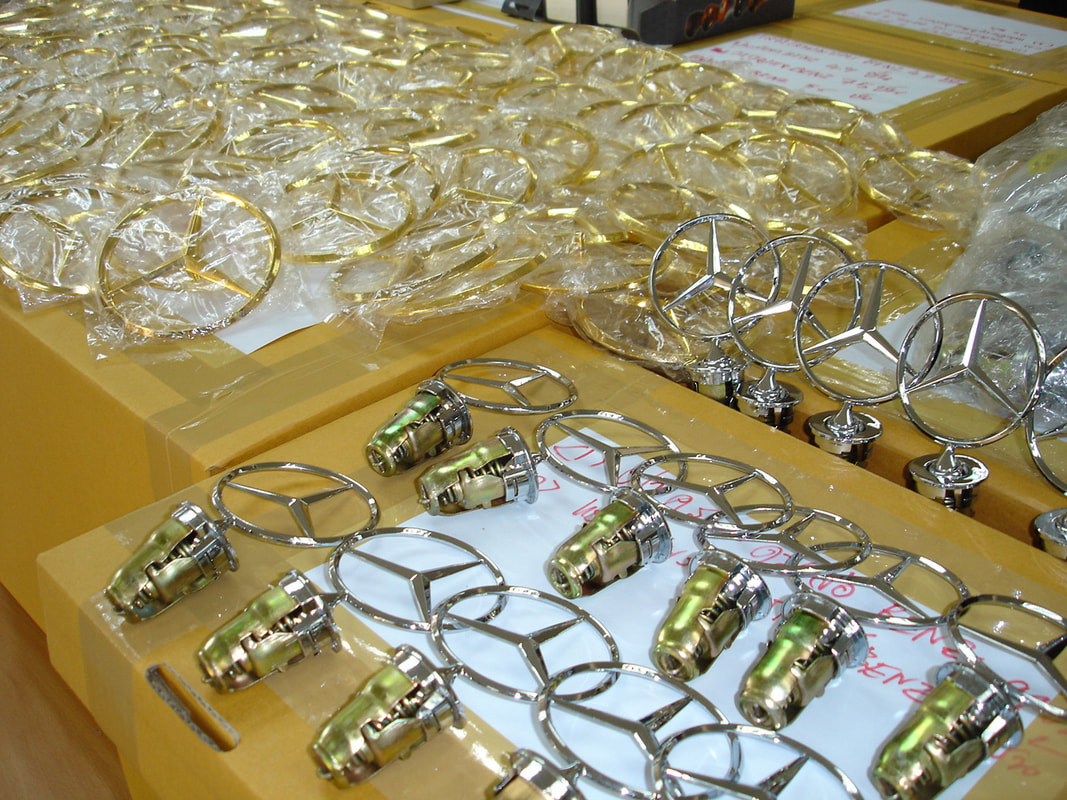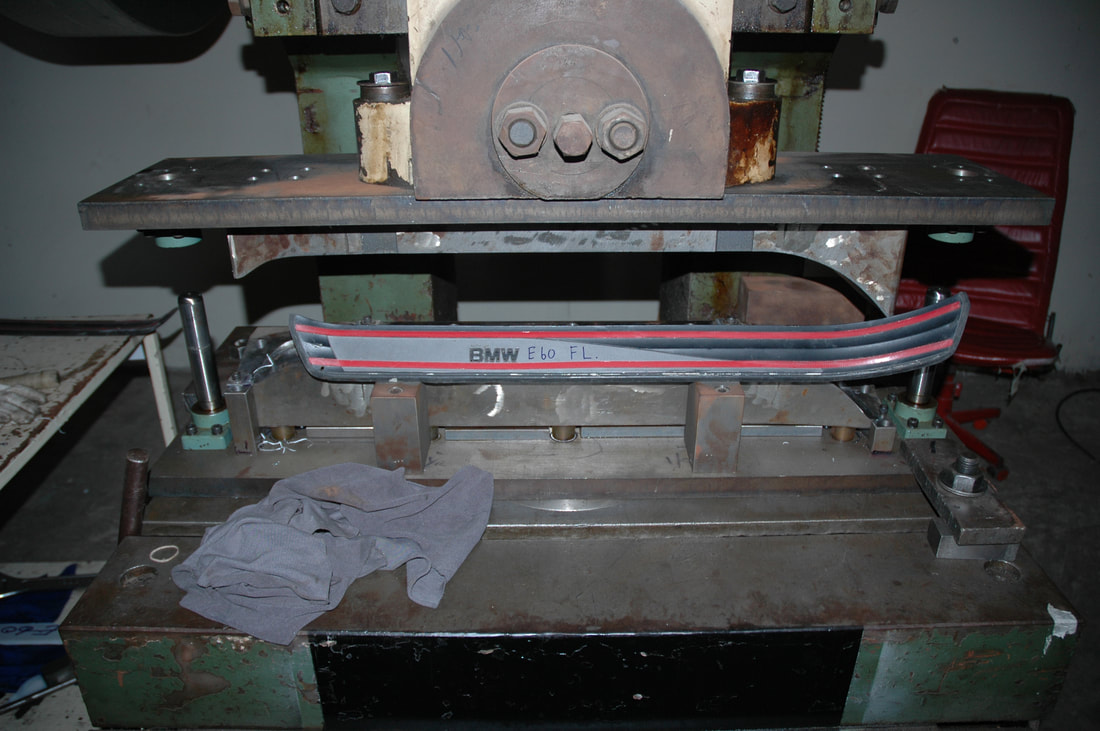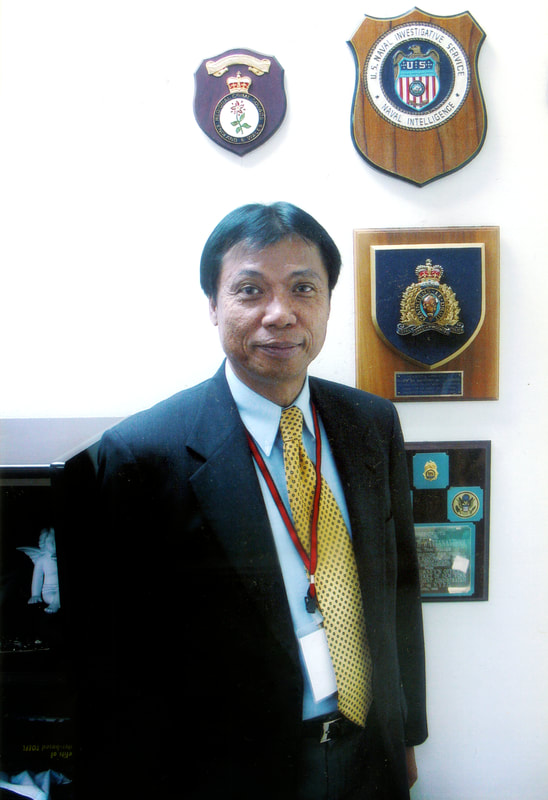The robust and growing automotive industry of Thailand’s Eastern Seaboard has caused it to be referred to in recent years as the ‘Detroit of Asia.’
Thailand is currently the world’s second largest pick-up truck market after the United States, as well as being Asean’s largest automotive market and assembler.
The automotive and auto parts industry is worth a staggering 700 billion baht. The Thai-based automotive industry produced 928,081 vehicles last year, an increase of 24% from 2003. Between January and August of this year, 710,889 units were made – representing a 22% year-on-year growth – and it is expected that the total number of units will exceed one million for the whole year.
In fact, the auto industry is the number one manufacturing industry in Thailand in terms of value, with automobiles, motorcycles and spare parts manufactured in numerous factories throughout the country.
However, according to law enforcement sources and some car makers, there’s a dark side to this success which tarnishes the reputation of the country, the industry and the brand names of auto manufacturers operating here. Thailand has also become a major producer and exporter – ahead of its nearest rival China – of fake car accessories and decorations sporting prestigious logos.
The October 5, 2005 seizure of a huge number of such fakes from a factory in Ban Pong district of Ratchaburi province clearly illustrates the seriousness of the problem. The factory operator, as of last week was offering Mercedes-Benz and BMW products on its website.
The raid followed an investigation by the Department of Special Investigations (DSI). Dubbed ‘the Thai FBI’ after the US Federal Bureau of Investigation, the DSI is a civilian law enforcement agency established in 2002 under the Ministry of Justice.
“Since its formation, the DSI has investigated and taken action in many important cases throughout Thailand,” explained Yongyoot Srisattayachon, a former public prosecutor who joined the agency a year ago as director of its Bureau of Intellectual Property Crime.
“My principal responsibility is to suppress the violations on trademarks, intellectual property, patents and integrated circuits. We are only going after the ‘big guys’, and have already arrested quite a few of them involved with fake leather goods, clothes, shoes and mobile phones,” said Yongyoot.
His section is supported by 122 officers out of the more than 1,000 selected from various police units who are now attached to the DSI headquarters.
“As for the raid in Ban Pong,” Yongyoot explained, “we received a complaint from a Southeast Asia representative of DaimlerChrysler company that this particular factory was producing counterfeit accessories for various leading automobiles such Mercedes-Benz, BMW and General Motors.”
Before the raid, the DSI placed all four large buildings inside the factory compound under surveillance for almost two weeks.
It was no easy task because the facilities were constructed on flat land, making it extremely difficult for DSI officers to keep their watch without being spotted. They had to park their vehicles at a distance and walk in, using surveillance equipment and other methods to monitor all activities outside and inside the buildings.
Thailand is currently the world’s second largest pick-up truck market after the United States, as well as being Asean’s largest automotive market and assembler.
The automotive and auto parts industry is worth a staggering 700 billion baht. The Thai-based automotive industry produced 928,081 vehicles last year, an increase of 24% from 2003. Between January and August of this year, 710,889 units were made – representing a 22% year-on-year growth – and it is expected that the total number of units will exceed one million for the whole year.
In fact, the auto industry is the number one manufacturing industry in Thailand in terms of value, with automobiles, motorcycles and spare parts manufactured in numerous factories throughout the country.
However, according to law enforcement sources and some car makers, there’s a dark side to this success which tarnishes the reputation of the country, the industry and the brand names of auto manufacturers operating here. Thailand has also become a major producer and exporter – ahead of its nearest rival China – of fake car accessories and decorations sporting prestigious logos.
The October 5, 2005 seizure of a huge number of such fakes from a factory in Ban Pong district of Ratchaburi province clearly illustrates the seriousness of the problem. The factory operator, as of last week was offering Mercedes-Benz and BMW products on its website.
The raid followed an investigation by the Department of Special Investigations (DSI). Dubbed ‘the Thai FBI’ after the US Federal Bureau of Investigation, the DSI is a civilian law enforcement agency established in 2002 under the Ministry of Justice.
“Since its formation, the DSI has investigated and taken action in many important cases throughout Thailand,” explained Yongyoot Srisattayachon, a former public prosecutor who joined the agency a year ago as director of its Bureau of Intellectual Property Crime.
“My principal responsibility is to suppress the violations on trademarks, intellectual property, patents and integrated circuits. We are only going after the ‘big guys’, and have already arrested quite a few of them involved with fake leather goods, clothes, shoes and mobile phones,” said Yongyoot.
His section is supported by 122 officers out of the more than 1,000 selected from various police units who are now attached to the DSI headquarters.
“As for the raid in Ban Pong,” Yongyoot explained, “we received a complaint from a Southeast Asia representative of DaimlerChrysler company that this particular factory was producing counterfeit accessories for various leading automobiles such Mercedes-Benz, BMW and General Motors.”
Before the raid, the DSI placed all four large buildings inside the factory compound under surveillance for almost two weeks.
It was no easy task because the facilities were constructed on flat land, making it extremely difficult for DSI officers to keep their watch without being spotted. They had to park their vehicles at a distance and walk in, using surveillance equipment and other methods to monitor all activities outside and inside the buildings.
| The trap is sprung “When we were quite sure that the factory produced counterfeits, we obtained search warrants from the Intellectual Property Court,” said Yongyoot. As 70 DSI officers under his command stormed the four buildings, another team went to Ramkhamhaeng Road to search the company’s head office and showroom. “We were accompanied by representatives of Mercedes- Benz, BMW and General Motors, who examined and identified the fake products for us on the spot. The raids proceeded without incident, as none of the about 120 employees, all Thai nationals resisted,” said Yongyoot. According to the director, the DSI confiscated 58,458 fake items of 95 different products belonging to the three brands, mostly for the interior of the vehicles, such as logos, key holders, gear shift knobs, door trims and so on. Among all the seized items, the steering wheels are the main concern because the originals have airbags built in, whereas the fakes don’t. So this represents a serious safety hazard for the driver. |
The factory does not make engine parts but can speedily produce whatever orders it receives, according to the DSI. “We impounded 20 machines that have produced so many fakes that the seized merchandise filled a 10-wheel truck that was used to transport it to the DSI storage in Bangkok,” Yongyoot said.
The DSI also found fake accessories of other companies, mainly Japanese, but couldn't confiscate them because no complaints had been lodged with the DSI. “In fact, we told them in advance about the case, but they didn’t respond,” Yongyoot revealed.
The DSI arrested the company's general manager in his office, and the factory manager at the manufacturing plant. They were charged with trademark infringement, an offence that carries a maximum four-year jail term or 400,000 baht fine or both. They are currently on bail pending a court hearing.
“The company is run by three people, including a Spanish national who is the key man behind the business and two Thais. Another foreigner, an American, was a quality controller who looked after the machinery as well. We have summoned them all for questioning and will use the two foreigners as witnesses,” Yongyoot added.
When interviewed, Karl-Heinz Heckhausen, president and CEO of DaimlerChrysler (Thailand) Limited, said he was concerned about the problem.
“Fake parts endanger lives and are strictly forbidden within our organisation. They affect our business badly and are not stored and/or offered within our dealers network. Thailand is not the only country that faces this kind of problem because fake parts are also offered in other countries,” he said.
The company operating the factory sold the fakes to more than 100 outlets in Thailand, mainly car accessories shops, according to Yongyoot. The DSI is now examining relevant documents to see whether legal action can be taken against the shops.
The DSI also discovered documents indicating that some unauthorised dealers of Mercedes-Benz cars in Thailand had bought parts from the factory. They are currently under investigation. “If they have purchased, for example, a steering wheel without a trademark, then we can’t do very much against them. We are still checking. The factory was making items with and without trademarks, including for brands that had authorised them to do so,” said Yongyoot.
He also disclosed that according to records seized, the company had exported parts and accessories to Australia, Germany, Hong Kong, Japan, the Netherlands, Singapore, Taiwan, the United Kingdom, the United States and other countries. “We are still investigating. We have names of companies abroad who bought the products. We are going to check with the Customs Department. We are also going to contact law enforcement agencies in other countries to see if we can prove that fake products were sent there,” he added.
According to experts, the quality, workmanship and appearance of the fakes compare favourably with genuine items and the machinery inside the factory is of top quality. The operation was the biggest of its kind known to operate in Southeast Asia, but Yongyoot suspects that there are others in Thailand. .
His view is shared by Mr Heckhausen, who said: “We believe that there are other manufacturers faking our products.” He added that DaimlerChrysler actively informs the public and customers about how dangerous it is to use fake parts.
“Fake parts do not meet our strict and very tight quality and safety standards. Should a customer install fake parts in a Mercedes-Benz car no warranty can be claimed,” said Mr Heckhausen.
Unfortunately, fake parts are in many cases copied so well that it is hard to differentiate them from the originals.
The DSI also found fake accessories of other companies, mainly Japanese, but couldn't confiscate them because no complaints had been lodged with the DSI. “In fact, we told them in advance about the case, but they didn’t respond,” Yongyoot revealed.
The DSI arrested the company's general manager in his office, and the factory manager at the manufacturing plant. They were charged with trademark infringement, an offence that carries a maximum four-year jail term or 400,000 baht fine or both. They are currently on bail pending a court hearing.
“The company is run by three people, including a Spanish national who is the key man behind the business and two Thais. Another foreigner, an American, was a quality controller who looked after the machinery as well. We have summoned them all for questioning and will use the two foreigners as witnesses,” Yongyoot added.
When interviewed, Karl-Heinz Heckhausen, president and CEO of DaimlerChrysler (Thailand) Limited, said he was concerned about the problem.
“Fake parts endanger lives and are strictly forbidden within our organisation. They affect our business badly and are not stored and/or offered within our dealers network. Thailand is not the only country that faces this kind of problem because fake parts are also offered in other countries,” he said.
The company operating the factory sold the fakes to more than 100 outlets in Thailand, mainly car accessories shops, according to Yongyoot. The DSI is now examining relevant documents to see whether legal action can be taken against the shops.
The DSI also discovered documents indicating that some unauthorised dealers of Mercedes-Benz cars in Thailand had bought parts from the factory. They are currently under investigation. “If they have purchased, for example, a steering wheel without a trademark, then we can’t do very much against them. We are still checking. The factory was making items with and without trademarks, including for brands that had authorised them to do so,” said Yongyoot.
He also disclosed that according to records seized, the company had exported parts and accessories to Australia, Germany, Hong Kong, Japan, the Netherlands, Singapore, Taiwan, the United Kingdom, the United States and other countries. “We are still investigating. We have names of companies abroad who bought the products. We are going to check with the Customs Department. We are also going to contact law enforcement agencies in other countries to see if we can prove that fake products were sent there,” he added.
According to experts, the quality, workmanship and appearance of the fakes compare favourably with genuine items and the machinery inside the factory is of top quality. The operation was the biggest of its kind known to operate in Southeast Asia, but Yongyoot suspects that there are others in Thailand. .
His view is shared by Mr Heckhausen, who said: “We believe that there are other manufacturers faking our products.” He added that DaimlerChrysler actively informs the public and customers about how dangerous it is to use fake parts.
“Fake parts do not meet our strict and very tight quality and safety standards. Should a customer install fake parts in a Mercedes-Benz car no warranty can be claimed,” said Mr Heckhausen.
Unfortunately, fake parts are in many cases copied so well that it is hard to differentiate them from the originals.
Behind the story:
Yongoot Srisattayachon, who was in charge of the case from the start, gave me an update after the arrests and seizures were made. One of his staff gave me photos of some of the seized goods, the factory and the machinery inside.
After this article was published in November 2005, a foreigner with a heavy beard approached me at a nightspot that is popular with expats in Bangkok. I’d seen him on many occasions over the years. He was always well dressed, always alone, and he hardly spoke to anyone. But this night he came right up and asked if my name was Maxmilian. Before I could even answer, he said quickly: “Most what the DSI told you are lies and nonsense… They are corrupted. You shouldn’t write this. I am not worried about the case because nothing will happen.”
Whenever I saw this man afterwards he avoided me, and I did the same. I asked a waiter at the nightspot about the man and he told me he came in almost every night, but he never ordered anything and almost never spoke to anyone. But the waiter added that once or twice the man was sitting with some foreigners who he described as “mafia.”
Many months after the raid on the factory I asked DSI officers what was happening with the case. I never received a clear answer, and I soon stopped asking
Yongoot Srisattayachon, who was in charge of the case from the start, gave me an update after the arrests and seizures were made. One of his staff gave me photos of some of the seized goods, the factory and the machinery inside.
After this article was published in November 2005, a foreigner with a heavy beard approached me at a nightspot that is popular with expats in Bangkok. I’d seen him on many occasions over the years. He was always well dressed, always alone, and he hardly spoke to anyone. But this night he came right up and asked if my name was Maxmilian. Before I could even answer, he said quickly: “Most what the DSI told you are lies and nonsense… They are corrupted. You shouldn’t write this. I am not worried about the case because nothing will happen.”
Whenever I saw this man afterwards he avoided me, and I did the same. I asked a waiter at the nightspot about the man and he told me he came in almost every night, but he never ordered anything and almost never spoke to anyone. But the waiter added that once or twice the man was sitting with some foreigners who he described as “mafia.”
Many months after the raid on the factory I asked DSI officers what was happening with the case. I never received a clear answer, and I soon stopped asking




 RSS Feed
RSS Feed
















